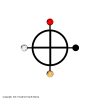Yeah, there's no good answer to a question like "Are the modern French people more Celtic, Latin, or Germanic?"
Ethnically, they're probably mostly Celtic, but Celtic religion and language was gone long ago—except in Brittany. But there are also genetic contributions from Latin peoples in the south and from Germanic peoples in the east and Normandy. Linguistically, French people are absolutely Latin, with almost no contribution to the modern French language from Gaulish or Frankish. The names "French" and "France" come from a Germanic people, and so does the general organization of the country, since the Frankish invaders were the one who founded what eventually became the Kingdom of France and then the French Republic. But the Franks didn't really introduce their pagan religion—they converted to Christianity early in French history. Speaking of which, the dominant religion of the French is Roman Catholicism, so Latin... but that doesn't mean much either, considering that Christianity is a missionary religion that can spread anywhere. Also, Roman (and Greek) culture influenced all of Europe, especially during the Renaissance, so the degree to which any European people is Latin may be overestimated. The real answer is that "the French people" is a concept that makes sense only when you combine all these influences together.
This is a theoretical question, since France will almost never adopt paganism in game. Maybe we should ask what kind of neopaganism would have been the most likely to take hold in France. Outside of Brittany, I'd say it's probably Olympianism. After all, the French words for the days of the week are based mostly on Roman gods: mardi = Mars, mercredi = Mercury, jeudi = Jupiter, etc.
For England, it's probably between Druidism and Germanic paganism (Asatru or whatever other name you want to give it, there are many: Heathenry, Theodism, Fyrnsidu, etc.). Both seem popular among neopagans.
Not sure about Spain and Portugal and their colonies, but the Latin influence is probably the strongest. Italy has to use Olympianism.

 in all cities in addition to economic effects).
in all cities in addition to economic effects). . Well, I have read some texts, including the ones that Krieger-FS and MechatronicJazz indicated, and I found that the Ghana Empire worshipped a black snake called Bida, who is believed to be the reason for the empire's wealth in their mythology. However, I found no reference to this deity being worshipped by the malinke too. One detail I have found reading a resume of The Epic of Sundiata is that the baobab tree was called S'ra and has been described to have healed Sundiata from his physical illness. I believe that the name S'ra, a baobab tree or its leaf (to be more simple) as an icon and a sacred grove or tree could be representatives of these people's traditional faith. I found this image that can help wit the icon's art. If not, I can find another.
. Well, I have read some texts, including the ones that Krieger-FS and MechatronicJazz indicated, and I found that the Ghana Empire worshipped a black snake called Bida, who is believed to be the reason for the empire's wealth in their mythology. However, I found no reference to this deity being worshipped by the malinke too. One detail I have found reading a resume of The Epic of Sundiata is that the baobab tree was called S'ra and has been described to have healed Sundiata from his physical illness. I believe that the name S'ra, a baobab tree or its leaf (to be more simple) as an icon and a sacred grove or tree could be representatives of these people's traditional faith. I found this image that can help wit the icon's art. If not, I can find another.

